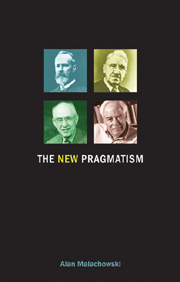Book contents
- Frontmatter
- Contents
- Preface
- Acknowledgements
- Abbreviations
- 1 Introducing the New Pragmatism
- 2 Leaving classic pragmatism behind
- 3 Rorty against the tradition
- 4 Putnam's contributions
- 5 Putnam and Rorty: pragmatism without reconciliation
- 6 Prospects
- Conclusion: the New Pragmatism and philosophy
- Notes
- Reading the New Pragmatists
- Bibliography
- Index
6 - Prospects
- Frontmatter
- Contents
- Preface
- Acknowledgements
- Abbreviations
- 1 Introducing the New Pragmatism
- 2 Leaving classic pragmatism behind
- 3 Rorty against the tradition
- 4 Putnam's contributions
- 5 Putnam and Rorty: pragmatism without reconciliation
- 6 Prospects
- Conclusion: the New Pragmatism and philosophy
- Notes
- Reading the New Pragmatists
- Bibliography
- Index
Summary
If there is anything distinctive about pragmatism, it is that it substitutes the notion of a better human future for the notions of ‘reality’, ‘reason’, and ‘nature’. One may say of pragmatism what Novalis said of Romanticism, that it is the apotheosis of the future.
(Richard Rorty, Philosophy and Social Hope)The revival of pragmatism can itself be explained on pragmatic grounds.
(Alan Wolfe, The Missing Pragmatic Revival in American Social Science)One of the obstacles to the New Pragmatism's progress in the short term is the resistance of the analytic establishment. Some of this is self-serving. It pays to keep old philosophical disputes going. New Pragmatists deny a selfless version of this. Precisely because there is no real pay-off and because they are bored by the lack of genuinely productive results, the ‘doldrums’ Margolis referred to, they want to stake out uncharted territory, to visit Rorty's promised land where controversies over distinctions such as those between mind and body or appearance and reality seem beside the point and the theories developed to deal with such controversies appear to be irrelevant. There is also a strong element of proper philosophical motivation in the analytic resistance. But even this leaves much to be desired.
A good deal of the intransigence mirrors the reaction of the early critics of classic pragmatism. The old view that social criteria of rationality and truth lead inexorably to relativism on the practical front and self-defeat on the intellectual front is recycled again and again when analytic philosophers confront the New Pragmatism.
- Type
- Chapter
- Information
- The New Pragmatism , pp. 99 - 128Publisher: Acumen PublishingPrint publication year: 2009



